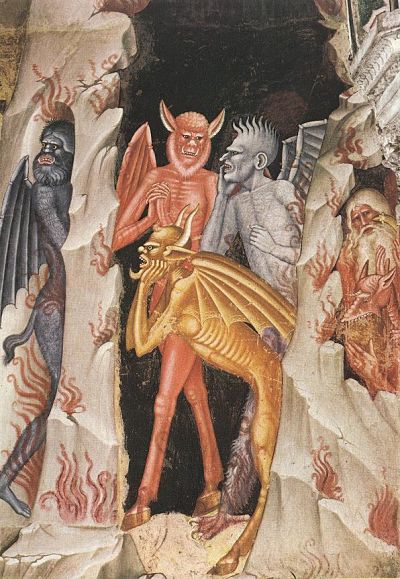 Any time someone associates lawyers and devils, the analogy sort-of-works.
Any time someone associates lawyers and devils, the analogy sort-of-works.
I know. Some of my best friends are lawyers. Really. And I am sorry for the lawyer jokes Phil and Leland, but they are as irresistible as a grieving widow to a lawyer. There are whole websites for lawyers jokes, many classics from my childhood:
What is the difference between God and lawyer? God doesn’t think he is a lawyer.
Many Christians associate the “satan,” the lawyerly accuser in the Book of Job, with Satan, the fallen angel, though many do not. My theology professors were always careful to distance the “accuser” in the book of Job from Satan in the New Testament. That’s new to many Christians, though it should not be.
This brings us to a question from a friendly skeptic of Christianity.
M* asks:
- Satan appears to have a very different character in the Hebrew Bible than he does in the New Testament . . .. At what point do you think that Satan’s character changed from being “the prosecuting attorney” to the embodiment of all evil?**
When answering this sort of problem, I prefer to accept as many assumptions in the question as possible. If “the satan” is simply an accuser in the drama of Job, then there is no tension. The Greek New Testament borrows the word to describe someone similar, but a different sort of accuser, not God’s satan, but Satan: the evil one. The satan becomes a type (perhaps the original role?) of Satan. Any accuser is like Satan, though also unlike in other ways.
Let’s assume, however, that is not the solution, no matter how plausible. Instead, let’s accept the premise of the question and agree with other scholars that the satan in Job is Satan.
First, Satan is very bad, but he is not the “embodiment of all evil.” That is not possible. There are three types of evil: the world, the flesh, and the devil. I do not need Satan for me to be tempted by the world or the flesh. Trust me.
Second, Satan is a creation of God. As a result, he is good in so far as he exists. He lies, he is fallen, but he is still God’s creation. In one very limited sense (existence) everything that is (every object) is God’s. He is not perfectly evil, the opposite of God. There is no such thing as “perfect” evil.
Third, evil beings can do good things or serve good ends. Many wretches serve God indirectly by what they mean for evil being turned to good. The “accuser” gives glory to God when God has mercy on the accused! I once knew a wretched man, angry and bad, but in his work he provided a livelihood to many. That was good, though he was often bad.
So it might be with Satan, if he is the satan of Job. He tries to do evil, “I shall accuse Job!”, but God turns it to good for Job, for the world, and for God. The accuser is correct, but he is not loving and merciful.
So M*, the satan of Job is on many traditional Christian readings not the Satan of the New Testament, but may be an image of the role used by writers as they learned about Satan. This is not unlike Babylon who is often compared to Satan based on Isaiah 14. The king of Babylon is not Satan, but he is like Satan. If the satan of Job is Satan, then in Job he is fulfilling his good role in God’s cosmos, even if he wishes to do harm.
Oft what we mean for evil is turned to good and so it is with Satan. He cannot win.
—————————-
*M is a non-Christian that sent me 55 questions early this year. He has asked that I not reveal his or her name. I will write as if “he” is a male, but this is for convenience. I do not know if I will get to all his questions. Here are questions 1, 2, 3, 17, 23, 26, 27, 28, 34, 35, 37 , 54 , and 55.
** I edited out a mention of YouTube videos that did not have links in the question. Here is the missing text: “(see youtube videos by Rabbi Tovia Singer and Rabbi Michael Skobac)”














